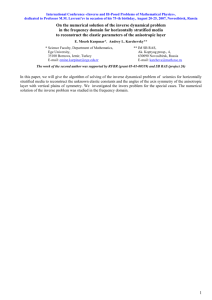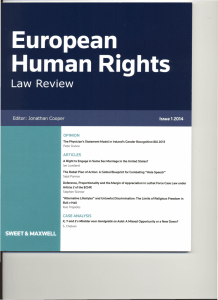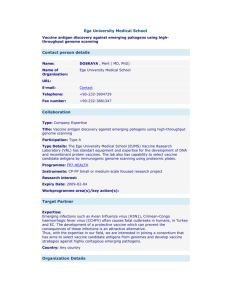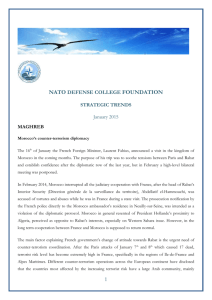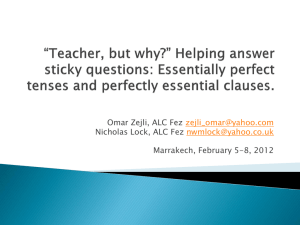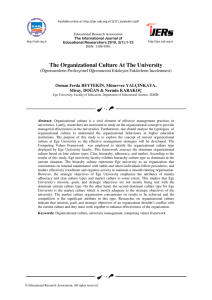Academics Department Rabat School of Governance and Econom
advertisement
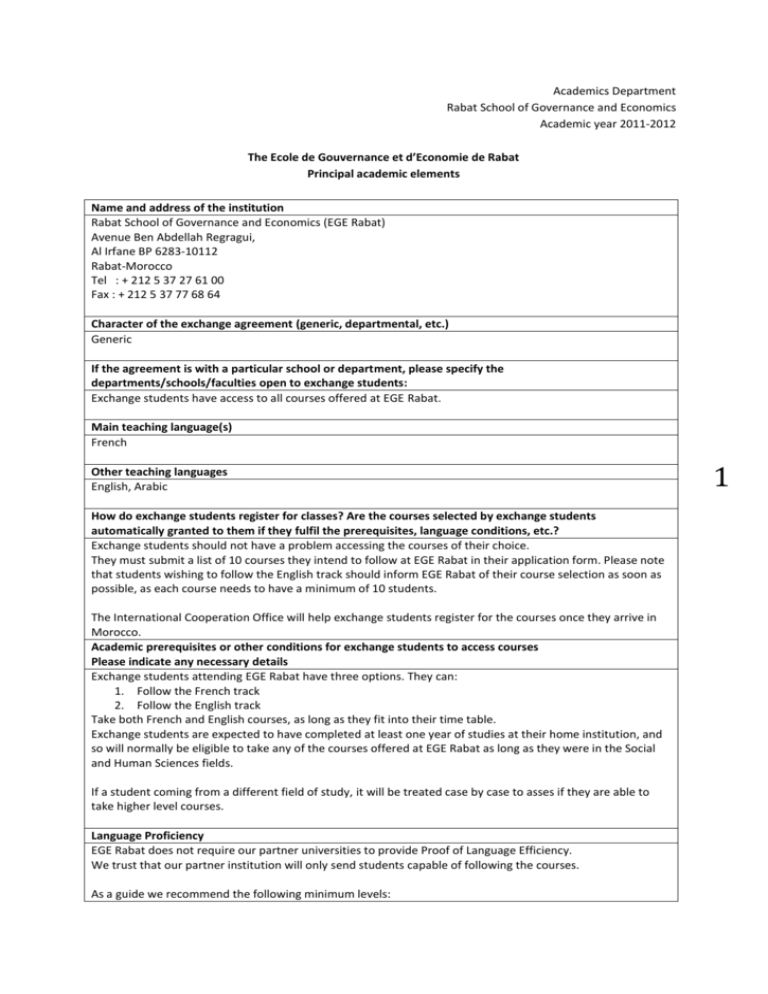
Academics Department Rabat School of Governance and Economics Academic year 2011-2012 The Ecole de Gouvernance et d’Economie de Rabat Principal academic elements Name and address of the institution Rabat School of Governance and Economics (EGE Rabat) Avenue Ben Abdellah Regragui, Al Irfane BP 6283-10112 Rabat-Morocco Tel : + 212 5 37 27 61 00 Fax : + 212 5 37 77 68 64 Character of the exchange agreement (generic, departmental, etc.) Generic If the agreement is with a particular school or department, please specify the departments/schools/faculties open to exchange students: Exchange students have access to all courses offered at EGE Rabat. Main teaching language(s) French Other teaching languages English, Arabic How do exchange students register for classes? Are the courses selected by exchange students automatically granted to them if they fulfil the prerequisites, language conditions, etc.? Exchange students should not have a problem accessing the courses of their choice. They must submit a list of 10 courses they intend to follow at EGE Rabat in their application form. Please note that students wishing to follow the English track should inform EGE Rabat of their course selection as soon as possible, as each course needs to have a minimum of 10 students. The International Cooperation Office will help exchange students register for the courses once they arrive in Morocco. Academic prerequisites or other conditions for exchange students to access courses Please indicate any necessary details Exchange students attending EGE Rabat have three options. They can: 1. Follow the French track 2. Follow the English track Take both French and English courses, as long as they fit into their time table. Exchange students are expected to have completed at least one year of studies at their home institution, and so will normally be eligible to take any of the courses offered at EGE Rabat as long as they were in the Social and Human Sciences fields. If a student coming from a different field of study, it will be treated case by case to asses if they are able to take higher level courses. Language Proficiency EGE Rabat does not require our partner universities to provide Proof of Language Efficiency. We trust that our partner institution will only send students capable of following the courses. As a guide we recommend the following minimum levels: 1 French courses: 400/500 TCF; B2 DELF / C1 DALF English courses: 6.0 IELTS / 550 TOEFL (paper based) Language classes offered for exchange students Exchange students can take Arabic, French and/or English language courses at EGE Rabat. Please refer to EGE’s course catalogue for full details. One of EGE’s strengths is its teaching of contemporary Arabic. EGE Rabat’s approach distances itself from the classical and poetic Arabic that is traditionally taught and addresses instead the major contemporary political, economic and social debates while putting into use the modernized Arabic language, integrating linguistic elements which are constantly evolving according to the need of the people to describe the world they live in. Please identify the name and full contact details of the person responsible for academic supervision The academic supervision at EGE Rabat follows a structure usually applied in the French higher education system, which differentiates the administrative aspects (credit transfer, grades surveillance, class attendance, course registration, etc.) from the strictly pedagogical and content-related elements (recruitment of professors, format and workload of classes, syllabus and class contents, etc.). Administrative regulations (Direction de la Scolarité): Mr. Abdellah GHALI Deputy Director abdellah.ghali@egerabat.com Academics and contents (Direction des Etudes): Mme. Mathilde BERENI Academic Director mathilde.bereni@egerabat.com Credit system used and its main characteristics EGE Rabat uses the ECTS credit system. ETC credits are based on the successful competition of the workload needed in order to achieve expected learning outcomes. The learning outcomes are what a student is expected to know, understand and be able to do after successful completion of a course, while workload indicates the time students typically need to complete all learning activities (such as lectures, seminars, projects, practical work, self-study and examinations) required to achieve the expected learning outcomes. Students are expected to complete 60 ECTS credits during a full academic year at EGE Rabat. In the majority of cases, a student’s workload ranges from 1,500 to 1,800 hours for an academic year, whereby one credit corresponds to 25 to 30 hours of work per semester. One course is generally between 6 and 8 credits. The main characteristics of a typical module (workload, range, size, format, for example) The “classic” courses at EGE consist of 13 sessions, each session lasting 2 hours. Each student will need to prepare certain documents for each course (scientific articles, reference extracts, other supporting documents…). On average 40 pages per session. Each student needs to complete approximately 2 to 3 papers/research projects per course. How many credits are recommended for an exchange student takes? This corresponds to how many courses? 2 As a reference: EGE Rabat regular students follow an intense program which requires them to take at least 7 modules per semester. EGE Rabat would recommend exchange students to take 4 or 5 modules. Nevertheless the final decision is up to the students and their home institutions. Please note the credits differ from course to course. In general one full semester course is between 6 and 8 credits. Main information concerning the assessment, evaluation and notation system Assessment mode and range can vary depending on the course outline and its format. Typical forms of assessment at EGE Rabat are oral presentations, written examinations, short papers, etc. In general students’ performance is evaluated throughout the entire semester and a final written exam takes place during the last week of each semester. EGE Rabat uses the European Credit Transfer System (ECTS). ECTS credits assess the workload of the courses, while ECTS letter grades express the ranking of a students against his/her peers (see table below). As a Moroccan higher education institution EGE Rabat includes in its transcripts grades corresponding to the Moroccan grading system, which uses a 20-point scale: 0-9=fail; 10-20 pass. ECTS standard grading scale ECTS grade Percentage of successful students A Student’s performance was among the top 10% of the class. B Student’s performance was among the following 25% of the class. C Student’s performance was among the following 30% of the class. D Student’s performance was among the following 25% of the class. E Student’s performance was among the following 10% of the class. F Student failed the class Does the institution allow students to re-sit exams? Please detail arrangements to be made in the event of academic failure and how the School will deal with requests for extenuating circumstances. Students are allowed to re-sit an examination only in extenuating circumstances, such as illness or in the case of a family emergency. Student’s who miss an exam, as the result of extenuating circumstances, will be given a new examination date. Normally this is close to the original date. In most cases the exam will differ from the one already sat by his or her classmates. What is the policy of your institution concerning class attendance for exchange students? The EGE Rabat programmes are very structured. So while, students on exchange are not required to take as many courses as EGE Full time students, they are expected to attend the lectures and seminars. 3 EGE Rabat’s policy regarding class attendance: For courses of 26 hours or more, a student can miss two classes. For courses of 25 hours, the student can only miss one class. If they are absent for more than the above mentioned classes they are forced to withdraw. For exchange students who may have specific concerns, for example they are doing an internship or need to travel, can speak to the Direction de la Scolarité, who will treat each case individually. Please include any other information concerning the academic system at your institution that you consider relevant 4

